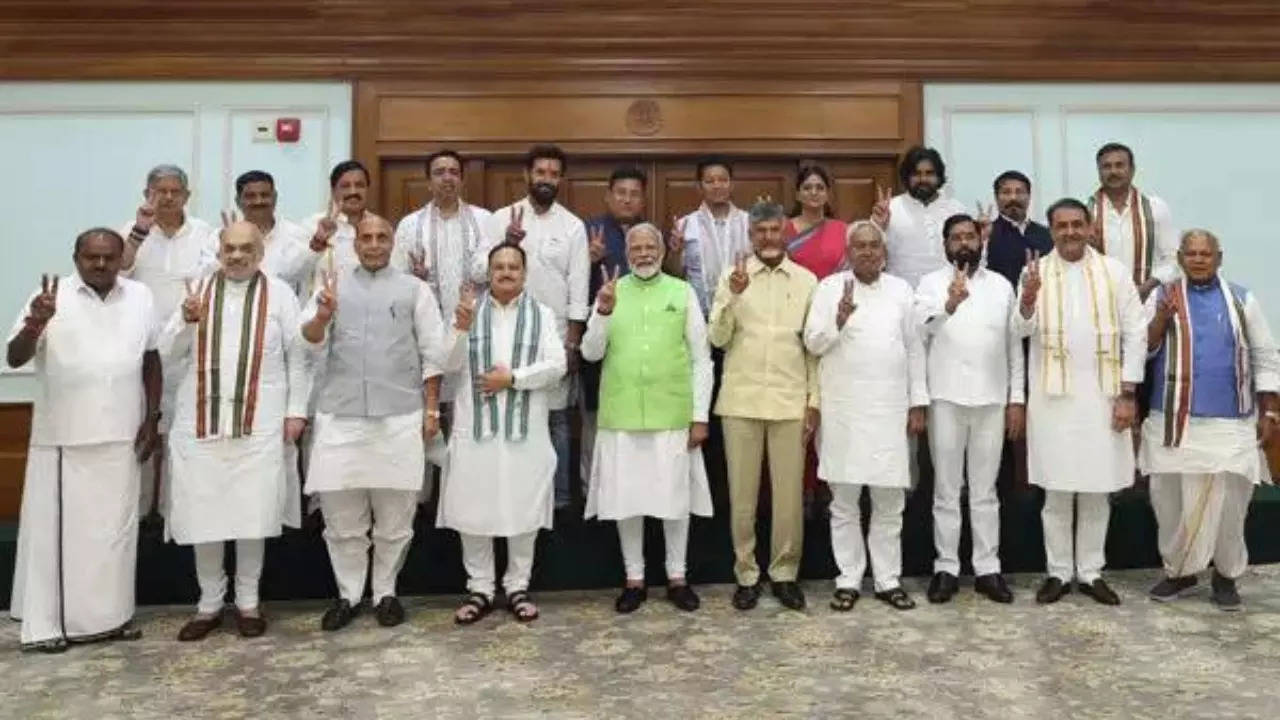[ad_1]
NEW DELHI: The new BJP-led NDA government, dependent on its allies, since on its own the saffron party is short of 32 votes from the simple majority mark of 272 in a House of 543 Lok Sabha seats, will find it difficult to push for BJP’s hard Hindutva line, since its main support comes from secular parties like TDP and JD(U).
Among the NDA partners, substantial support to BJP which finished with 240 seats, comes from N Chandrababu Naidu’s TDP representing Andhra Pradesh and Nitish Kumar’s JDU representing Bihar.
With that equation holding the Narendra Modi-led government, it will be difficult for BJP to push its hard Hindutva line, since Naidu and Kumar have both to cater to its minority voters in their respective states. Both seasoned, veteran leaders have been known for wooing minority voters and hence would have to take care to see minority citizens are not offended.
Even before the swearing-in, TDP general secretary and Naidu’s son Nara Lokesh on Friday made a public statement saying his party is committed to the current 4% reservation for Muslims under the OBC list, as it is meant to expose the under-represented to opportunities.
Naturally the previous Modi government’s policies of bringing CAA and NRC or approving UCC in some states and other such RSS-driven policies that hurts interests of minorities, are bound to hit a roadblock for now, if the government has to function.
Even BJP’s hard Hindutva party line will have to be blurred, to create a comfort zone for the allies, who have become crucial for the survival of Modi’s third term at office.
Kumar has been pushing for a national caste census, that RSS-BJP are uncomfortable with, hence it is to be seen whether it becomes a sticky point in the new coalition or the Modi government agrees to it.
The minority population in Andhra Pradesh is 36.63 lakh (excluding Christians) as per the 2011 census of which Muslims 36.17 lakhs, Sikhs 0.10 lakhs, Buddhists 0.04 lakhs, Jains 0.27 lakhs and Parsis 0.04 lakhs. That Naidu will also head the state government in Andhra Pradesh, makes it more significant for him to be able to address the issues of the minorities.
Bihar is home to almost 17% Muslims apart from other minorities and hence Kumar’s JD(U) has traditionally opposed anti-minorityism. In fact, for a long time before Kumar accepted working with Modi, even as there has been many flip-flops since, it was Modi’s anti-minority image during his chief ministership days in Gujarat, that created a political divide between the two leaders.
While it is a matter of the past, it would not be easy for Kumar to accept hard-Hindutva agenda that was the mark of the last terms of Modi’s majority government.
Among the NDA partners, substantial support to BJP which finished with 240 seats, comes from N Chandrababu Naidu’s TDP representing Andhra Pradesh and Nitish Kumar’s JDU representing Bihar.
With that equation holding the Narendra Modi-led government, it will be difficult for BJP to push its hard Hindutva line, since Naidu and Kumar have both to cater to its minority voters in their respective states. Both seasoned, veteran leaders have been known for wooing minority voters and hence would have to take care to see minority citizens are not offended.
Even before the swearing-in, TDP general secretary and Naidu’s son Nara Lokesh on Friday made a public statement saying his party is committed to the current 4% reservation for Muslims under the OBC list, as it is meant to expose the under-represented to opportunities.
Naturally the previous Modi government’s policies of bringing CAA and NRC or approving UCC in some states and other such RSS-driven policies that hurts interests of minorities, are bound to hit a roadblock for now, if the government has to function.
Even BJP’s hard Hindutva party line will have to be blurred, to create a comfort zone for the allies, who have become crucial for the survival of Modi’s third term at office.
Kumar has been pushing for a national caste census, that RSS-BJP are uncomfortable with, hence it is to be seen whether it becomes a sticky point in the new coalition or the Modi government agrees to it.
The minority population in Andhra Pradesh is 36.63 lakh (excluding Christians) as per the 2011 census of which Muslims 36.17 lakhs, Sikhs 0.10 lakhs, Buddhists 0.04 lakhs, Jains 0.27 lakhs and Parsis 0.04 lakhs. That Naidu will also head the state government in Andhra Pradesh, makes it more significant for him to be able to address the issues of the minorities.
Bihar is home to almost 17% Muslims apart from other minorities and hence Kumar’s JD(U) has traditionally opposed anti-minorityism. In fact, for a long time before Kumar accepted working with Modi, even as there has been many flip-flops since, it was Modi’s anti-minority image during his chief ministership days in Gujarat, that created a political divide between the two leaders.
While it is a matter of the past, it would not be easy for Kumar to accept hard-Hindutva agenda that was the mark of the last terms of Modi’s majority government.
[ad_2]
Source link



